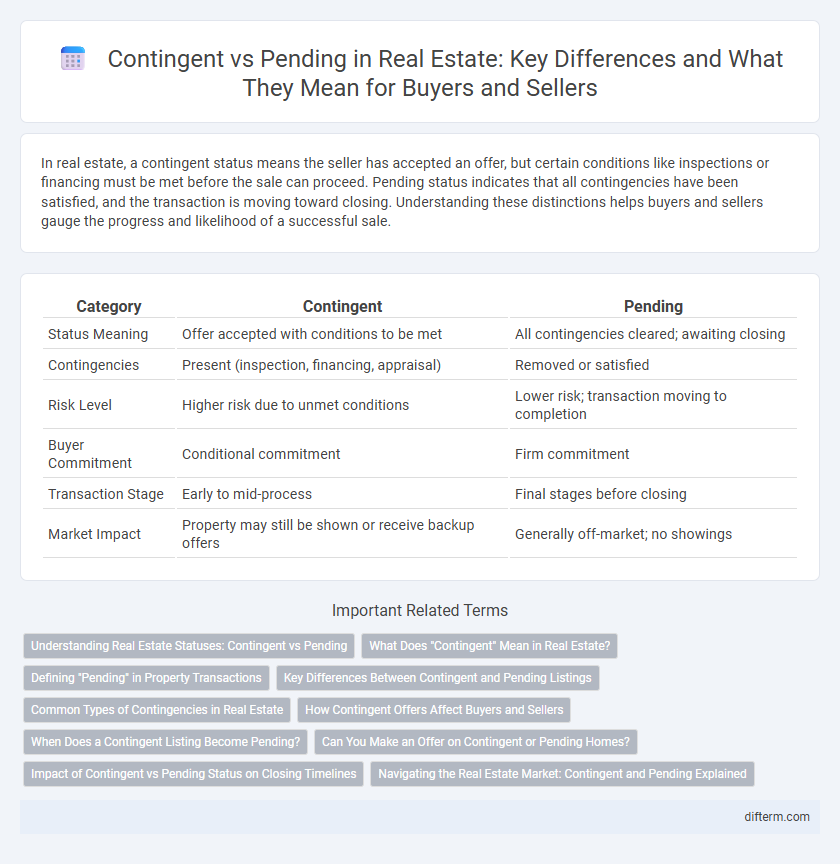In real estate, a contingent status means the seller has accepted an offer, but certain conditions like inspections or financing must be met before the sale can proceed. Pending status indicates that all contingencies have been satisfied, and the transaction is moving toward closing. Understanding these distinctions helps buyers and sellers gauge the progress and likelihood of a successful sale.
Table of Comparison
| Category | Contingent | Pending |
|---|---|---|
| Status Meaning | Offer accepted with conditions to be met | All contingencies cleared; awaiting closing |
| Contingencies | Present (inspection, financing, appraisal) | Removed or satisfied |
| Risk Level | Higher risk due to unmet conditions | Lower risk; transaction moving to completion |
| Buyer Commitment | Conditional commitment | Firm commitment |
| Transaction Stage | Early to mid-process | Final stages before closing |
| Market Impact | Property may still be shown or receive backup offers | Generally off-market; no showings |
Understanding Real Estate Statuses: Contingent vs Pending
Contingent status in real estate indicates an accepted offer on a property that is subject to specific conditions, such as inspections or financing approval, allowing the seller to continue marketing the home. Pending status means all contingencies have been met, and the sale is moving toward closing without further conditions. Understanding the difference between contingent and pending helps buyers and sellers gauge the likelihood of a successful transaction and timeline expectations.
What Does "Contingent" Mean in Real Estate?
Contingent" in real estate indicates that an offer has been accepted on a property, but certain conditions, such as financing approval, home inspections, or appraisal results, must be met before the sale can proceed. This status signals that the property is still technically available, as the deal could fall through if contingencies are not satisfied. Contingent listings allow buyers a chance to back out or renegotiate based on the fulfillment of these critical contractual terms.
Defining "Pending" in Property Transactions
Pending in real estate refers to a property transaction that has an accepted offer and is moving toward closing but has not yet finalized all contractual obligations. This status indicates that all contingencies have been met, inspections completed, and financing secured, signaling near completion of the sale process. Pending properties are different from contingent properties, where certain conditions must still be satisfied before moving toward closing.
Key Differences Between Contingent and Pending Listings
Contingent listings indicate that an offer has been accepted but certain conditions, such as financing or inspections, must be met before the sale progresses, allowing the seller to keep the property on the market. Pending listings signify that all contingencies have been satisfied and the sale is moving toward closing, with minimal chances for negotiations or cancellations. Understanding these statuses helps buyers and sellers navigate the transaction timeline and manage expectations effectively.
Common Types of Contingencies in Real Estate
Contingent and pending statuses in real estate indicate key stages in the home buying process where contingencies affect the transaction's progress. Common types of contingencies include financing, inspection, appraisal, and sale contingencies, which protect buyers by allowing contract termination if certain conditions are unmet. Understanding these contingencies helps buyers and sellers navigate contract obligations and reduces the risk of deal fallout.
How Contingent Offers Affect Buyers and Sellers
Contingent offers in real estate allow buyers to secure a property while meeting specific conditions such as financing approval or home inspections, providing flexibility but potentially delaying closing timelines. For sellers, contingent offers indicate a serious buyer but carry the risk of the deal falling through if contingencies aren't met, potentially requiring additional showings or offers. Understanding the nuances of contingent status helps both parties manage expectations and negotiate terms effectively during the sales process.
When Does a Contingent Listing Become Pending?
A contingent real estate listing becomes pending when all specified contingencies, such as inspections, financing approvals, and appraisals, are successfully met or waived by the buyer and seller. This transition indicates that the property is under contract but still requires fulfillment of these conditions before closing. Pending status reflects a more advanced stage in the sales process, signaling that the deal is moving closer to completion.
Can You Make an Offer on Contingent or Pending Homes?
Buyers can make offers on contingent homes since these properties are still under contract but allow for other offers if certain conditions aren't met. Pending homes, however, have passed all contingencies and are typically not open to new offers as the sale is near completion. Understanding the difference between contingent and pending status is crucial to strategize effectively in competitive real estate markets.
Impact of Contingent vs Pending Status on Closing Timelines
Contingent status indicates that an offer has been accepted but is subject to specific conditions, often extending the closing timeline due to inspections, appraisals, or financing approvals. Pending status means all contingencies have been met, signaling an imminent closing with minimal delays expected. Understanding the distinction is critical for buyers and sellers to accurately anticipate the timeline and prepare for finalizing the real estate transaction.
Navigating the Real Estate Market: Contingent and Pending Explained
Contingent status in real estate indicates an accepted offer with specific conditions that must be met before closing, such as inspections or financing approval. Pending status means all contingencies are satisfied and the sale is moving toward finalization, typically awaiting only the closing date. Understanding these stages helps buyers and sellers accurately assess market activity and set realistic expectations during property transactions.
Contingent vs Pending Infographic

 difterm.com
difterm.com